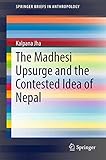The Madhesi Upsurge and the Contested Idea of Nepal [electronic resource] / by Kalpana Jha.
Material type: TextSeries: SpringerBriefs in AnthropologyPublisher: Singapore : Springer Singapore : Imprint: Springer, 2017Description: XVII, 111 p. online resourceContent type: text Media type: computer Carrier type: online resourceISBN: 9789811029264Subject(s): Social sciences | Asia -- History | Peace | Ethnicity | Social Sciences | Ethnicity Studies | Conflict Studies | History of South AsiaAdditional physical formats: Printed edition:: No titleDDC classification: 305.8 LOC classification: GN495.6Online resources: e-book Full-text access
TextSeries: SpringerBriefs in AnthropologyPublisher: Singapore : Springer Singapore : Imprint: Springer, 2017Description: XVII, 111 p. online resourceContent type: text Media type: computer Carrier type: online resourceISBN: 9789811029264Subject(s): Social sciences | Asia -- History | Peace | Ethnicity | Social Sciences | Ethnicity Studies | Conflict Studies | History of South AsiaAdditional physical formats: Printed edition:: No titleDDC classification: 305.8 LOC classification: GN495.6Online resources: e-book Full-text access | Item type | Current library | Collection | Call number | Copy number | Status | Notes | Date due | Barcode |
|---|---|---|---|---|---|---|---|---|
| E-Books | MEF eKitap Kütüphanesi | Springer Nature | GN495.6 (Browse shelf (Opens below)) | Available | NATURE | 1419585-1001 |
CHAPTER-I History of Nepal amid Contentions: The rise of Madhesi Identity -- CHAPTER-II Ethnic Awakening In South Asia: Drawing Analogy with Nepal -- CHAPTER-III The Construction of Nepali Identity: Onset of Madhes Struggle -- CHAPTER-IV Democratic Innovations, Globalisation and Identity Formation -- CHAPTER-V The Vulnerable Sovereign -- CHAPTER-VI Contemporary Politics: Directions and Dilemma -- CHAPTER-VII End of a Rebellion or beginning of new era of Revolution? Annex-I: Agreements between the Government of Nepal and the agitating Janajatis and Madhesi -- Annex- II: Caste and Ethnic Groups of Nepal.
This book is set against the burning issue of ethnic uprisings in the Madhes region of Nepal and analyses debates on the idea of contemporary Nepal. The limited view of Nepal as a primarily hill nation with Nepali-speaking people ignores the vast ethnic and linguistic diversity of the country. It has particularly rendered stateless the Madhesi community which inhabits the plains bordering India and shares closer cultural affinity and marital ties across the border. Increasing demands for ethnic and territorial autonomy by the Madhesis suggest the need for redefining the idea of Nepal and establishing Madhesi identity as Nepali identity while at the same time addressing the deeply contested idea of regional versus social identity in the region. This book uses narratives from the Madhesi community including from prominent Madhesi analysts and activists, to define their identity as well as their aspirations in a democratic Nepal. It also provides a perspective on the internal dynamics of caste and language of this region and their possible impact on consolidating ethnic identities in Nepal.
5
